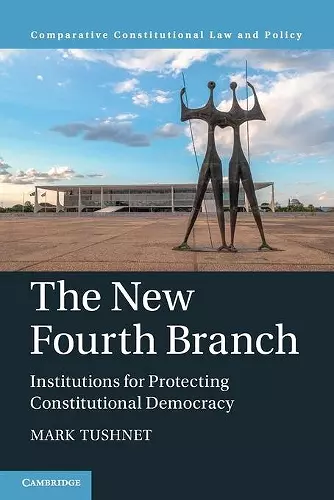The New Fourth Branch
Institutions for Protecting Constitutional Democracy
Format:Paperback
Publisher:Cambridge University Press
Published:2nd Sep '21
Currently unavailable, and unfortunately no date known when it will be back
This paperback is available in another edition too:
- Hardback£69.99(9781316517833)

Analyses why constitution-designers have come to establish institutions protecting constitutional democracy in modern constitutions.
Institutions protecting constitutional democracy, such as election commissions and anticorruption investigators, are an increasingly important feature in modern constitutions. The book explains why these institutions are needed in a world where competition among political parties can undermine rather than protect democracy.Twenty-first-century constitutions now typically include a new 'fourth branch' of government, a group of institutions charged with protecting constitutional democracy, including electoral management bodies, anticorruption agencies, and ombuds offices. This book offers the first general theory of the fourth branch; in a world where governance is exercised through political parties, we cannot be confident that the traditional three branches are enough to preserve constitutional democracy. The fourth branch institutions can, by concentrating within themselves distinctive forms of expertise, deploy that expertise more effectively than the traditional branches are capable of doing. However, several case studies of anticorruption efforts, electoral management bodies, and audit bureaus show that the fourth branch institutions do not always succeed in protecting constitutional democracy, and indeed sometimes undermine it. The book concludes with some cautionary notes about placing too much hope in these – or, indeed, in any – institutions as the guarantors of constitutional democracy.
'In an age when integrity and democracy are under unprecedented pressure, Mark Tushnet's description of emerging constitutional 'best practice' worldwide – systematic, realistic, and unemotional – helps to launch a new debate on whether, and how, the civic virtues that underpin good governance might be better institutionalized for all.' A. J. Brown, Professor of Public Policy & Law, Griffith University; Board Member, Transparency International
'For a discipline that has inexplicably remained focused on the role of apex courts for much of its existence, comparative constitutional studies should welcome Mark Tushnet's new book on the fourth branch as a sorely necessary intervention in the field. Mark captures the intuition that there is something distinctive about this new category of constitutional actors, increasingly popular with constitution makers, with characteristic insight and scholarly rigour. His characterization of the fourth branch as comprising 'institutions to protect constitutional democracy' will no doubt encourage other theoretical attempts to find an appropriate conceptual substitute for the numerical placeholder for this branch. This book is an essential read for anyone interested in understanding constitutions, their functions, and their limits.' Tarunabh Khaitan, Professor of Public Law and Legal Theory & Hackney Fellow in Law, Wadham College, University of Oxford
'In this already indispensable work on the theory and practice of designing innovative government structures to protect constitutional democracy, Tushnet brilliantly and carefully appraises existing 'fourth branch' institutions. A scholarly provocation favoring decentralized structures and remedies with more face-to-face interactions, the book demands reading by all serious scholars of constitutional government.' Vicki C. Jackson, Laurence H. Tribe Professor of Constitutional Law, Harvard Law School
ISBN: 9781009048491
Dimensions: 228mm x 154mm x 11mm
Weight: 300g
220 pages